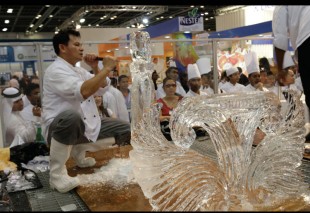

Chefs urge rethink on top culinary competition

Operators submitting chefs to participate in Dubai’s Salon Culinaire event must re-assess their approach to drive competition standards, chefs have claimed.
Commenting on the competition, which attracts entrants from all over the region and runs in conjunction with trade show Gulfood, Michael Kitts — head chef and senior lecturer at Emirates Academy of Hospitality Management — noted: “What can be a bit disappointing is when it becomes all about numbers; hotels being able to say they’ve got 1500 entrants.
“They’d be better off sending quality people who would raise the standard, as opposed to sticking anyone in simply to up their figures.”
Al Bustan Rotana Dubai executive chef Christophe Prud’homme agreed the event had become incredibly popular. “The [Salon Culinaire] is a must — all hotels have to send their chefs every year, and try to get more medals than other properties. But really, what does that attitude achieve at the end of the day?” he queried.
“It comes down to the fact that hotel restaurants should be allowed to select their own candidates for these events. Because if your hotel group tells you ‘the pastry class is big, we need to send all 14 pastry chefs’, that is not the point; the point is that you send those who are capable of competing at the required standard, and who are in with a fighting chance of getting those medals,” Prud’homme asserted.
According to Emirates Academy’s Kitts, the current approach to events like Salon Culinaire means the industry is losing out on some of the beneficial effects of such culinary competitions.
“We’re basically diluting the product, with too many competitors going in for too many events,” he asserted.
Commenting on the number of participants at the Salon Culinaire, Andy Cuthbert, chairman of event organiser the Emirates Culinary Guild (ECG), noted: “The number of people that enter is up to the hotels and their chefs; and we count ourselves very fortunate that there is so much interest from the F&B community here.
At the show, we have got a cap on how many chefs per property can enter each class,” he continued.
“But apart from that, the competitor limit is really dictated by space and logistics, and by the show’s opening hours.
“Certainly it can be better for the overall quality of a competition if someone sends one chef along, who they feel confident will do well and bring home a medal, than sending the whole team regardless of their standard, then chastising them for not winning gold,” continued Cuthbert.
“But the standard we see among competitors at the Salon is really down to the operations that submit them.”
Considering other ways to drive competition standards, Dubai World Trade Centre executive sous chef Raimund Haemmerle — who praised the event for the opportunity it afforded young chefs in the region to learn and progress — did note that when the Salon started out and was held every two years, there was “really time for chefs to focus and to train”. “Every year is a lot of pressure,” he admitted.
But ECG’s Cuthbert explained: “Being annual means we are able to stay abreast of industry trends — and on top of that, the interest we see each year from all the entrants shows that the demand is there.”